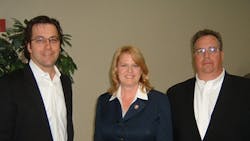Distributor Adds Value to Roundtable Discussion
HVAC wholesale distributor Munch Supply Co., a member of the Heating, Airconditioning & Refrigeration Distributors International (HARDI), was invited to participate in Congresswoman Melissa Bean’s (IL-8) Environmental Roundtable on June 2, 2009 at Roosevelt University’s Schaumberg campus. The roundtable included 20 companies involved in energy efficiency and environmentally-friendly products and services that were asked to share their successes and challenges since enactment of the American Recovery and Reinvestment Act (ARRA or “the stimulus bill”) in mid-February. Munch Supply employs 120 people across six locations in Illinois and has been helping HVAC contractor customers take advantage of the expanded residential HVAC tax credits and weatherization funding authorized by ARRA.
Represented by President Robert Munch, and Sales Manager, Keith Kramer, Munch Supply explained how the residential tax credit has helped homeowners upgrade to high efficiency furnaces in the Chicago market, but that the prohibitively high qualifications for central air-conditioning and heat pump systems may limit the stimulus bill’s effectiveness. Further Munch and Kramer stressed the need for faster allocation of weatherization funding so HVAC distributors and contractors can prepare for these projects with certainty that they will be fully funded.
Munch also assisted HARDI in urging greater industry involvement in energy efficiency and climate change policy to ensure that incentives, targets, and standards are achievable and reasonable. Specifically citing concerns with proposed changes to building energy codes and appliance standards in current legislation introduced in the House of Representatives, Munch and HARDI teamed to stress the unintended consequences of overly aggressive energy code efficiencies that could deter new construction and other permitted projects during an already depressed construction market.
Munch hailed Representative Bean’s introduction of H.R. 2198 which would finally align the depreciation schedule of commercial HVAC and refrigeration systems with their useful lifetimes. This will encourage the retirement of old, inefficient HVACR equipment and immediately begin delivering energy and operating cost savings for building owners. In a formal statement submitted at the meeting, Munch urged support for sustaining these policies and expanding tax incentives for owners and operators of rental properties and commercial buildings to cut their energy costs, such as simple measures like allowing bonus depreciation of high-efficiency HVACR systems and expensing of best-in-class systems that could initiate a transformation of the existing building market.
